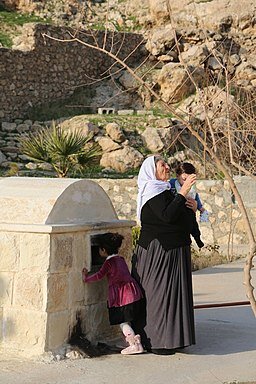Global Affairs Journal January 7, 2020 by
Dominique Batiste
The Forgotten War: Genocide of the Yazidi people
With tensions on edge in the Middle East, cultural and ethical diversities have been recognized as the basis of tensions in the region since the beginning of time. While mass media outlets provide headline news on the fluid changes in the region, there has been a recurring invasion of the Yazidi people known as a ‘forgotten war’.
In 2016, the United Nations Human Rights Panel pointed out the Islamic State of Iraq and the Levant (ISIL, also known as the Islamic State or Dá-esh) was directly responsible for the reoccurring acts of genocide of the Yazidis. “Per the Commission’s mandate, the report focuses on violations committed against Yazidis inside Syria, where it found that thousands of women and girls are still being held captive and abused, often as slaves.” (un.org, 2016). According to the United Nations, these reports are based on the information provided by survivors, local religious leaders, activists on the ground, journalists, and personnel in the region on humanitarian missions.
The Islamic State has maintained an objective of eliminating the Yazidi people through enslavement, forced conversion to Islam, or death. While most of the world has not heard of the Yazidi, the Islamic State hunts them down for one specific reason: their religious beliefs.
Religion

https://creativecommons.org/licenses/by-sa/4.0,
via Wikimedia Commons
The Yazidi religion is a mixture of Islam, Judaism, Nestorian Christianity, and ancient Iranian religions that existed prior to Iranians converting to Islam. While most religions gain followers through conversion, it is not possible within the religion of Yazidi; you have to be born into it. This Islamic State believes that the origin of the Yazidi name means ‘devil-worshipper’ and this assumption is further manifested by the use of fire during worship and the worship of Melek Taus, a being also known as the ‘Peacock Angel’. Yazidi people embrace the concept of both good and evil being intricate parts of creation and necessary qualities in their people. Being part of the Kurdish-speaking minority, the Yazidi people say they are not Kurds, but in fact some of the Kurdish population is Yazidi. (yazidiinternational.org, n.d.).
Yazidi religious beliefs are passed down orally, making the religious doctrine difficult for historians and scholars to research. With the coupling of a religious group refusing to convert to Islam, believing to be the direct descendants of only Adam in the Garden of Eden, and the misinterpretation of the name to be ‘devil-worshiper’, the Islamic State has sought to convert or eliminate the religious sect.
Genocide and Human Trafficking
According to the United Nations Human Rights Panel, the Islamic State has actively attempted to eradicate the Yazidis through mass killings, sexual slavery, torture, and inhumane treatment. (ohchr.org, 2016). Yazidi men and boys were separated, forced to convert to Islam or be killed. “Thousands of women and girls, some as young as 9 years old, have been sold in slave markets, or souk sabaya, in the Syrian governorates of Raqqah, Aleppo, Homs, Hasakah and Dayr Az- Zawr. ISIS and its fighters hold them both in sexual slavery and in slavery, the report says, with Yazidi women and girls being constantly sold, gifted and willed between fighters.” (un.org, 2016). The UN Commission also specified that there is no ‘path to international criminal justice available’, suggesting that countries enact laws to protect the Yazidi from further genocide in their regions.
References
UN Commission of Inquiry on Syria: ISIS is committing genocide against the Yazidis. (2016). Retrieved from https://www.ohchr.org/EN/NewsEvents/Pages/DisplayNews.aspx?NewsID=20113.
UN human rights panel concludes ISIL is committing genocide against Yazidis | UN News. (n.d.). Retrieved from https://news.un.org/en/story/2016/06/532312-un-human-rights-panel-concludes-isil-committing-genocide-against-yazidis.
Yezidis Faith ديانتنا. (n.d.). Retrieved from https://www.yezidisinternational.org/abouttheyezidipeople/religion/.